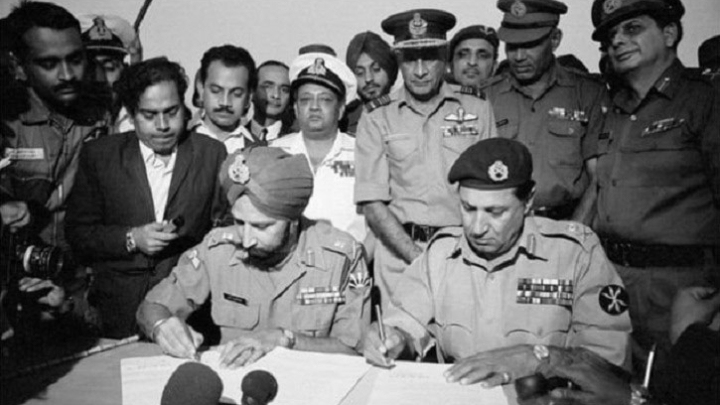Victory Day: The story of the history
Shining BD Desk || Shining BD
Father of the Nation Bangabandhu Sheikh Mujibur Rahman united the nation step by step to take part in the final battle for independence. In a historic speech in front of millions of people at the Racecourse Ground on March 7, 1971, he told everyone to be ready with whatever they have to deal with the enemy.
Bangabandhu said, 'This time the struggle is for our liberation, this time the struggle is for freedom.' After his speech, the whole country became agitated. On the night of March 25, the Pakistani aggressors attacked the unarmed people of Bangladesh. Bangabandhu was arrested that night. The war of liberation began.
The Mujibnagar government was sworn in on 17th April. In the absence of Bangabandhu, Syed Nazrul Islam acted as the caretaker President of this government and Tajuddin Ahmed became the Prime Minister. The war of liberation was led by this government.
In the last part of the 9-month war of liberation, on 3 December, the Indian forces, accompanied by the freedom fighters, launched a barrage of attacks on the Pakistani army across the Bangladesh. Unable to withstand the onslaught of the Allies, they retreated and began to gather in the big cities. At the same time, small groups of disbanded Pakistani troops began to surrender to the Joutho Bahini (Allied Forces).
Seeing that defeat was inevitable, on 14 December, the President of Pakistan, Yahya Khan, directed the Commander-in-Chief of the East, General AK Niazi, to immediately stop the fighting and take necessary measures to save the lives of the members of the armed forces.
That afternoon, Niazi sent a ceasefire proposal through the United States. On 15 December, Indian Army Chief General Sam Manekshaw called on the Pakistan Army to lay down arms and surrender.
Pakistani army chief General Hamid signaled to Niazi to agree to the proposal. Manekshaw declared a ceasefire on December 15 from 5 pm to 9 am the next day in order for Niazi to accept and implement the proposal. This period was later extended to three o'clock in the afternoon.
At 9:15 am on 16 December, Manekshaw sent Major General JFR Jacob, Chief of General Staff of the Eastern Indian Army, to Dhaka to finalize the surrender documents and formalities. During the talks in Dhaka, Niazi proposed to replace the word 'surrender' in the document with a 'ceasefire', but Jacob rejected it.
Meanwhile, the Pakistan army mentally conceded defeat. Jacob did not have to rush to get Niazi's consent to the ceremony, including the surrender document.
Finally, the historic document of surrender was officially signed between the winners and losers of the war of liberation on the afternoon of 16th December. Elsewhere in the country, surrender documents began to be signed locally until December 22.
The surrender ceremony took place at the Ramna Race Course garden in Dhaka (then the capital of East Pakistan, now the capital of Bangladesh) on 16 December 1971. Lieutenant-General A A K Niazi, Martial Law Administrator of East Pakistan, surrendered to Lieutenant General Jagjit Singh Aurora, Joint Commander of Indian and Bangladeshi Forces. Air Commodore A. K. Khandker, Deputy Chief of Staff of the Bangladesh Forces, represented the Provisional Government of Bangladesh at the surrender.
Also present were Rear-Admiral Mohammad Shariff, Commander of the Pakistani Naval Eastern Command and Air Vice-Marshal Patrick D. Callaghan of the Pakistan Air Force's Eastern Air Force Command, who signed the agreement.[citation needed] Lt. Gen Sagat Singh, Commander of the Indian IV Corps, Air Marshal Hari Chand Dewan, Commander of Indian Eastern Air Command, Maj Gen JFR Jacob, Chief of Staff of the Indian Eastern Command, acted as witnesses on behalf of India.
Aurora accepted the surrender without a word, while the crowd on the race course erupted in celebrations
The text of the surrender is now a public property of Indian, Bangladeshi and Pakistani governments and the text of the document can be seen on display in the National Museum in New Delhi. The text of the Instrument of Surrender document was as follows:
Pakistani Instrument of Surrender
The PAKISTAN Eastern Command agree to surrender all PAKISTAN Armed Forces in BANGLA DESH to Lieutenant-General JAGJIT SINGH AURORA, General Officer Commanding in Chief of Indian and BANGLA DESH forces in the Eastern Theatre. This surrender includes all PAKISTAN land, air and naval forces as also all para-military forces and civil armed forces. These forces will lay down their arms and surrender at the places where they are currently located to the nearest regular troops under the command of Lieutenant-General JAGJIT SINGH AURORA.
The PAKISTAN Eastern Command shall come under the orders of Lieutenant-General JAGJIT SINGH AURORA as soon as the instrument has been signed. Disobedience of orders will be regarded as a breach of the surrender terms and will be dealt with in accordance with the accepted laws and usages of war. The decision of Lieutenant-General JAGJIT SINGH AURORA will be final, should any doubt arise as to the meaning of interpretation of the surrender terms.
Lieutenant General JAGJIT SINGH AURORA gives a solemn assurance that personnel who surrender shall be treated with dignity and respect that soldiers are entitled to in accordance with provisions of the GENEVA Convention and guarantees the safety and well-being of all PAKISTAN military and para-military forces who surrender. Protection will be provided to foreign nationals, ethnic minorities and personnel of WEST PAKISTANI origin by the forces under the command of Lieutenant-General JAGJIT SINGH AURORA.
Signed Signed
(JAGJIT SINGH AURORA) (AMIR ABDULLAH KHAN NIAZI)
Lieutenant-General Lieutenant-General
General Officer Commanding in Chief Martial Law Administrator Zone B and
India and BANGLA DESH Forces in the Commander Eastern Command
Eastern Theatre (Pakistan)
16 December 1971 16 December 1971
Shining BD
























